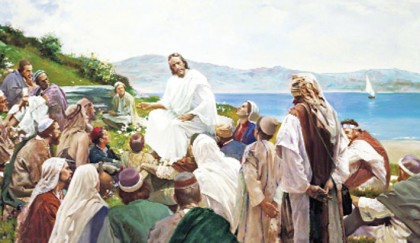CHRIST’S MESSAGE FOR SUPERFICIAL CHRISTIANS
First Reading: Ezekiel 18:21-28
Responsorial Psalm: 129(130)
Gospel Reading: Matthew 5:20-26
The gospel according to Matthew has been understood to possess a doctrinal character reflected in the five discourses of Christ. These five discourses correspond to the five books of the Pentateuch. Just as Moses received the Law from God on Mount Sinai and teaches the people, Christ also interprets and teaches the Law in five discourses beginning with the “Sermon on the Mount”. This way, the community of Matthew comprehends Christ as the New Moses; the one who has the sole authority to interpret and fulfil the Law (“Do not think that I have come to abolish the Law or the Prophets; I have not come to abolish them but to fulfil them” – Mt. 5:17). This Matthean sentiment above has a very strong connection with the season of Lent – a season of repentance and true conversion, a season to intensify our “love for God and our neighbour” – which is considered the summary of the whole Law and the Prophets’ (Mat. 22:39-40).
Delivering his Sermon on the Mount (the first of his discourses, cf. Mat. Chapter 5 – 7), Jesus proclaims the Kingdom of God and its demands. Today’s Gospel Reading (cf. Mat. 5:20-26) reflects a part of this sermon. As the authentic interpreter of the Law, He recalls the Old Law: “You have learnt how it was said to our ancestors: You must not kill; and if anyone does kill he must answer for it before the court.” After this, He interprets it with authority, saying: “But I say this to you…” This way, He not only speaks against killing but also the occasions and circumstances that may lead one to kill his fellowman – anger, foul language etc. The Pharisees who were noted as the interpreters and teachers of the Jewish Law would stop at “thou shall not kill”; however, for Christ, it is not enough to stay away from killing another man, but also to avoid situations that offend and harm others. Little wonder Christ says: ‘If your virtue goes no deeper than that of the scribes and Pharisees, you will never get into the kingdom of heaven.’ Consequently, He proposes a way of fraternal reconciliation as an indispensable tool for resolving conflicts.
Dear friends in Christ, our Lord wants us to renounce our wicked ways and return to him by embracing a deeper (Christian) virtue – a virtue that goes beyond the superficial (that of the scribes and Pharisees). He is the good Lord who takes no pleasure in the death of a wicked man but prefers his repentance and salvation, as reflected in the First Reading (cf. Ezekiel 18:21-28). No matter how the past has been, we can begin anew in the spirit of repentance in this Lenten season and embrace the Law of Love as put forward by Christ in today’s Gospel, for our God is rich in mercy and fullness of redemption who does not recall our guilt when we repent, just as today’s Psalmist {Psalm 129(130)} affirms: “If you, O Lord, should mark our guilt, Lord, who would survive? But with you is found forgiveness…with the Lord, there is mercy and fullness of redemption…”
Shalom!
© Fr. Chinaka Justin Mbaeri, OSJ
Paroquia Nossa Senhora de Fatima, Vila Sabrina, São Paulo, Brazil
nozickcjoe@gmail.com / fadacjay@gmail.com
___________________________________
PS: Have you prayed your Rosary today?



May God increase our ability to stay away from a deceptive lifestyle. Amen. Thanks
Thank you so much Padre. May God continue to strengthen you more in his Vine yard .
May the good Lord continue to protect you from any bad evils plans… Amen
Amen
Glory to God . Amen
Amen and Amen
Return to the Lord.
Indeed, if the Lord, should mark our guilt, no one would survive.
Thanks Padre for the enlightenment.
Amen.